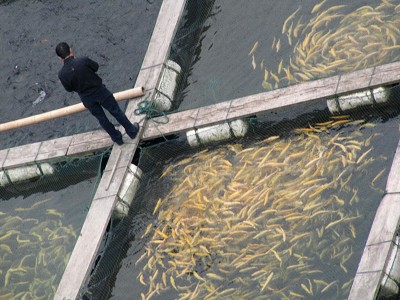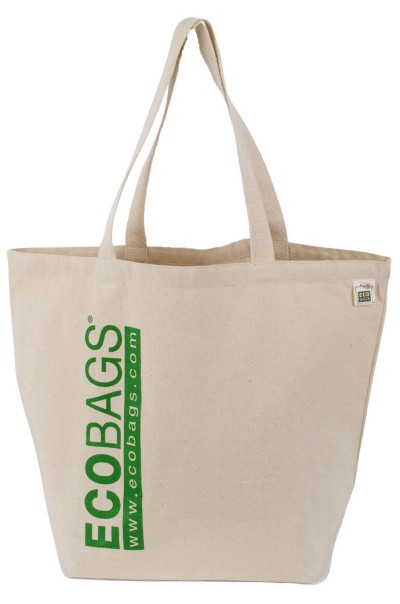
Farm-raised fish can still absorb mercury, since most fish farms are located in the ocean, close to or abutting the shoreline. They can also absorb PCBs and dioxins, as the near-shore waters they occupy are the first stop for run-off from land-based sources of pollution. Pictured: A fish farm in Shanghai. (Credit: Ivan Walsh, courtesy Flickr.)
Dear EarthTalk: I thought "farm raised" was the way to go when buying fish, to avoid mercury contamination. But are there other concerns about farm raised that make some fish a poor choice for good health? What are the safest fish to buy and which should be avoided? And what about those frozen blocks of fish I get at Trader Joe's? Are they safe to eat? -- Tim Jeffries, Springfield, MA
Mercury is a neurotoxin that settles into the ocean in large concentrations after we spew it out of industrial smokestacks when burning fossil fuels like coal and oil. It is then taken up by smaller sea life such as plankton and then spread up through the food chain as larger fish eat smaller ones. We humans then eat the mercury-laced seafood-wild salmon, tuna, swordfish and other fish-and breathe it in our air. Repeated exposure to mercury pollution can cause brain, kidney and developmental problems for people.
Farm-raised fish may have somewhat less exposure to mercury than their wild free-foraging cousins because they are usually fed a controlled diet, often consisting of more grains and soy, a cheaper and more abundant source of calories, than fishmeal. But they can still absorb mercury, since most fish farms are themselves located in the ocean, just close to or abutting the shoreline.
Farmed fish can also absorb PCBs and dioxins, as the near-shore waters they occupy are the first stop for run-off from land-based sources of pollution. And the fact that their primary feed source comes from conventionally grown terrestrial crops means that their diets can include trace amounts of pesticides and herbicides as well. Also, most farmed fish are exposed to dose after dose of antibiotics to keep diseases and pests at bay in their crowded underwater pens, much in the way "factory farmed" land animals are drugged to help them cope with cramped, unsanitary conditions. In fact, studies have shown that farm-raised fish have more toxins overall than their wild-caught cousins, though exceptions of course do exist.
The best way to know which fish are safe and which are not is to download a region-specific seafood buying guide from the Monterey Bay Aquarium's Seafood Watch program. These guides aid the decision-making process when shopping for seafood in a store or ordering it at a restaurant by dividing the fish available in that part of the country into three categories: Best Choices, Good Alternatives and Avoid.
And bring your Seafood Watch guide to Trader Joe's as well-at least for now. In 2010, after months of lobbying by Greenpeace and a growing number of concerned shoppers, Trader Joe's agreed to offer only "sustainable" seafood in its stores by the end of 2012. To its credit, they already removed endangered Chilean Sea Bass from shelves in 2005, followed by Orange Roughy in 2009 and Red Snapper in 2010.
In the spirit of its recent pledge, however, Trader Joe's is now working with third-party, science-based organizations to establish definitions and parameters for addressing customer concerns about overfishing, destructive catch or production methods, and the importance of marine reserves. Until 2013 at Trader Joe's-and indefinitely at other stores that haven't made specific commitments regarding the sustainability of their seafood-make sure to check that labels disclose the type of fish for sale and its source in regard to wild or farm-raised, and then check that info against the Seafood Watch list.
CONTACTS: Seafood Watch, www.montereybayaquarium.org/cr/seafoodwatch.aspx; Trader Joe's "Note to Our Customers about Trader Joe's Seafood," www.traderjoes.com/about/customer-updates.asp.

Plastic reusable shopping bags are petroleum-derived and may contain other contaminants, including lead, especially if they feature ornate designs or patterns. The safe bet is to use cloth bags, like the one pictured here from Eco Bags, because they are free of lead, they last for years, and they are easy to wash. (Credit: Eco Bags)
Dear EarthTalk: I heard that some reusable bags contain lead. Is this a major health concern? Can't these bags be made to avoid such contamination? -- Donald Young, Cincinnati, OH
It's true that some reusable shopping bags for sale in U.S. stores have been shown to contain lead, a neurotoxin linked to developmental, brain and kidney problems. The non-profit Center for Environmental Health (CEH) found that about 10 percent of the reusable bags it tested last year contained at least minute levels of lead, with Disney's "Toy Story" and "Cars" plastic reusable shopping bags topping the charts with excessive levels to the tune of 15 times the federal limit for lead in children's products.
Tests by other groups confirm CEH's findings. A November 2010 report by the Tampa Tribune newspaper found elevated levels of lead in reusable bags purchased at Winn-Dixie, Publix, Walmart and Target stores-and prompted an ongoing investigation by the U.S. Food & Drug Administration (FDA) into whether or not reusable shopping bags could be leaching lead into food items that people later eat. And earlier this year, the Center for Consumer Freedom, a trade group that opposes bans on plastic bags, reported that some 21 different polypropylene reusable bags sold at Safeway, Walgreen's, Bloom and other stores had lead content above 100 parts per million-the highest level that many states allow in consumer packaging.
While the stores in question have pulled any such questionable bags from their shelves and in some cases stopped patronizing offending suppliers, consumers should take matters into their own hands with regard to selecting safer reusable shopping bags. While plastic reusable shopping bags are a step in the right direction compared to disposable plastic or paper bags, they are still derived from petroleum, even if partly recycled, and may contain other contaminants, especially if they feature ornate designs or patterns. The safest bet, according to CEH, would be cloth bags: Not only are they usually free of lead or any other potentially hazardous substances, but they also last for years and are easy to wash. One quality, reliable source for cloth bags is the Ossining, New York-based Eco Bags, from which you can order conveniently online and pay no shipping costs on any order of $100 or more.
Regarding washing to reduce or eliminate contaminants, public health experts worry that reusable shopping bags could become a breeding ground for impurities that lead to food poisoning, and recommend washing them every few uses at least to ward off contamination. A 2008 Environmental and Plastics Industry Council of Canada study found mold and bacterial levels in reusable bags 300 percent greater than Canadian health standards allow. And a 2010 joint University of Arizona and Limo Loma University study found that 97 percent of users did not wash their reusable shopping bags-which can harbor bacteria from repeated exposure to meats and vegetables. Half of the 84 bags studied contained coliform, a bacterium found in fecal matter, while 12 percent tested positive for E. coli.
The moral of the story is to make sure your reusable shopping bags can go through the clothes washer-and then wash them a few times a month. This way you will steer clear of contaminating the food you and your family eat with trace amounts of lead, and as such you will sleep easier each and every night.
CONTACTS: CEH, www.ceh.org; Arizona/Limo Loma Study, www.uanews.org/pdfs/GerbaWilliamsSinclair_BagContamination.pdf; Eco Bags, www.ecobags.com.
EarthTalk® is written and edited by Roddy Scheer and Doug Moss and is a registered trademark of E - The Environmental Magazine ( www.emagazine.com ). Send questions to: earthtalk@emagazine.com.


